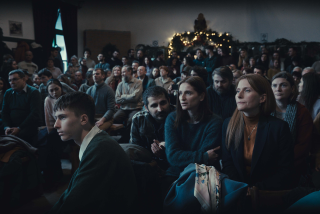‘Mr. Lazarescu’s’ death says a lot about life
- Share via
To borrow a phrase from Gabriel Garcia Marquez, it’s apparent from its title that “The Death of Mr. Lazarescu” is a chronicle of a death foretold. We know how one particular long night of the soul will end for our protagonist, even if he and the people he runs into on his final journey on Earth do not.
But death is not the exclusive property of Mr. Lazarescu; it belongs to us all, and in that sense this striking, singular film by Romanian director Cristi Puiu is really about life. A mordant parable of and about our time as well as a poem of personal urban decay, “Lazarescu” investigates how we treat one another, how we interact with the world. Puiu was inspired by Eric Rohmer’s “Six Moral Tales” to make this the first of a projected six studies of love, in this case love for one’s neighbor that is indicated by its ghost, by the way it isn’t there.
Inspired by a real case, “Lazarescu” is also quite specifically about the medical profession, about the callousness and scorn with which bored, overworked emergency room doctors, at least in Bucharest, treat the hapless patients who come their way. With society as well as his physical body falling apart, what ends for Lazarescu is not only his life, it’s his history as a person who society demands be treated with dignity and respect.
Not that, to be fair to those doctors, Lazarescu isn’t his own worst enemy. Irascible and unhelpful, a stubborn battler who can’t manage to keep food down or his mouth closed, Dante Remus Lazarescu (each name was chosen with care) is the patient from hell. But then he’s dying, isn’t he, and this pitiless film, characterized by the bitter black humor that typifies Eastern Europe cinema and the culture it comes out of, doesn’t even consider turning away.
Having alienated his daughter and his sister, widower Lazarescu (a marvelous Ion Fiscuteanu) lives with cats as prickly as he is in an heroically untidy Bucharest apartment. Sixty-two but looking much older with his worn face topped by a wool cap, Lazarescu’s vice is alcohol, which he swallows along with rationalizations like “I drink like any man.”On this particular night, however, Lazarescu’s brand of home brew is not doing him any favors. We meet him on the phone, calling for an ambulance because he’s been throwing up and having killer headaches for the past several days.
It’s not that his neighbors, intent on making jam, don’t really care about him. They’d like to be helpful, but they place rational limits on how much they can do, and at this pivotal moment in Lazarescu’s life, that will not be enough.
Initially Mioara (Luminita Gheorghiu), the nurse who eventually arrives with the ambulance, is in the same camp, willing to help but only to a point and on her own terms. But as she takes Lazarescu on his hellish pilgrimage, her attitude slowly changes. Like Good Deeds in the allegorical play “Everyman,” she is the only person willing to accompany her patient on the loneliest journey of his life.
For as the night gets longer and longer and Lazarescu gets weaker and more incoherent, hospital after hospital refuses to take him in. Arrogant, insistent on their prerogatives or just plain exhausted by what they’ve already done, the doctors he meets would rather deliver lectures on alcoholism or make jokes (“His liver is as big as the parliament house”) than actually do what is necessary to make this one man any kind of priority.
Though it is undeniably bleak and pessimistic and marked by a texture of observation worthy of British director Mike Leigh, “The Death of Mr. Lazarescu” is not as forbidding as it sounds. Nurse Mioara’s determination to persevere on her patient’s behalf takes on a heroic cast, as does his imminent passing. It may be true that no one can fix Mr. Lazarescu, but it matters greatly when people begin to care.
*
‘The Death of Mr. Lazarescu’
MPAA rating: Unrated
A Tartan Films release. Director Cristi Puiu. Screenplay Cristi Puiu, Razvan Radulescu. Director of photography Oleg Mutu. Running time: 2 hours, 34 minutes. In limited release.
More to Read
Only good movies
Get the Indie Focus newsletter, Mark Olsen's weekly guide to the world of cinema.
You may occasionally receive promotional content from the Los Angeles Times.





